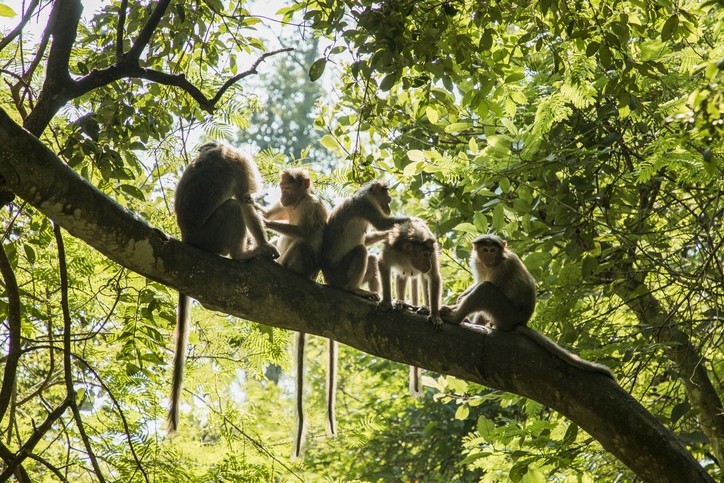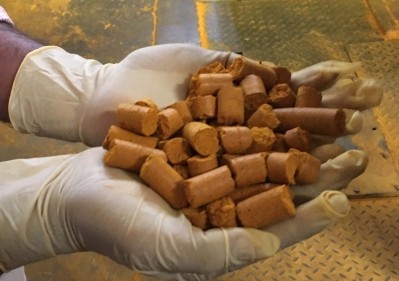Friends with microbial benefits

Scientists from the University of Oxford and the University of Colorado Boulder explored behavioral variation in a non-captive monkey population with respect to the abundance of specific bacterial genera.
The research, published in Frontiers in Microbiology, assessed social behavior based on grooming interactions in a population of monkeys, specifically rhesus macaques (Macaca mulatta) combined with gut microbiome data. They focused their analyses on microbiome genera previously linked to sociability and autistic behaviors in rodents and humans.
Study details
The population that was studied resides on Monkey Island (officially called Cayo Santiago). The small island off of the coast of Puerto Rico is home to about 1000 free-roaming Rhesus monkeys that contain several social groups. The monkeys are the offspring of an original group of monkeys imported from India that were used for scientific research in 1938. Operated by the University of Puerto Rico’s (UPR) Caribbean Primate Research Center (CPRC), the National Institutes of Health (NIH) and Harvard University, scientists there study the monkeys’ behavior, demographics, genetics and physiological changes.
The scientists focused on a single social group of rhesus macaques, which included 22 males and 16 females between the ages of six and 20 years old.
Grooming and the gut
Between 2012 and 2013, the authors collected a total of 50 uncontaminated stool samples from this social group. As a measure of social connectedness, they used the time each monkey spent grooming or being groomed in 2012 and 2013, and their number of grooming partners.
“Macaques are highly social animals and grooming is their main way of making and maintaining relationships, so grooming provides a good indicator of social interactions,” explained co-author Dr Karli Watson, Institute of Cognitive Science at the University of Colorado Boulder.
The team analyzed DNA from the stool samples to measure the composition and diversity of the gut microbial community, and looked at the relationship with social connectivity. They also took into account gender, age, season and rank within the group’s hierarchy. They zeroed in on microbes that have been shown to be either more or less abundant in people or rodents with autism-like symptoms (commonly accompanied by social disconnection) or are socially disadvantaged.
Social monkeys = good microbes
The researchers were able to show in this macaque population that some of these genera are also related to an individual’s propensity to engage in social interactions. Interestingly, they found that several of the genera positively related to sociability, such as Faecalibacterium, are well known for their beneficial effects on health and their anti-inflammatory properties. In contrast, the genus Streptococcus, which includes pathogenic species, is more abundant in less sociable macaques. The findings indicate that microorganisms whose abundance varies with individual social behavior also have functional links to host immune status. Overall, these findings highlight the links between social behavior, microbiome composition, and health in an animal population.
“Here we show that more sociable monkeys have a higher abundance of beneficial gut bacteria, and a lower abundance of potentially disease-causing bacteria,” said lead author Dr Katerina Johnson, a research associate at the Department of Experimental Psychology and the Department of Psychiatry of the University of Oxford. “It is particularly striking that we find a strong positive relationship between the abundance of the gut microbe Faecalibacterium and how sociable the animals are. Faecalibacterium is well known for its potent anti-inflammatory properties and is associated with good health.”
Conclusion
“As our society is increasingly substituting online interactions for real-life ones, these important research findings underline the fact that as primates, we evolved not only in a social world, but a microbial one as well,” noted co-author Dr Robin Dunbar, a professor from the Department of Experimental Psychology at the University of Oxford.
The authors concluded that this work adds to the growing research at the interface of microbial ecology and animal behavior, but also extends it in a novel direction.
“This is the first study to investigate whether microbial taxa previously associated with sociability or autistic traits are differentially abundant in an animal population with respect to individual variation in social behavior. Our findings advance our understanding of how gut microbial communities may be associated with host behavior and reveal that social relationships may be intertwined with health and immune status via the microbiota."
Source: Frontiers in Microbiology
11 November 2022 Sec. Microorganisms in Vertebrate Digestive Systems
doi.org/10.3389/fmicb.2022.1032495
“Sociability in a non-captive macaque population is associated with beneficial gut bacteria”
Authors: K. Johnson, et al.
















